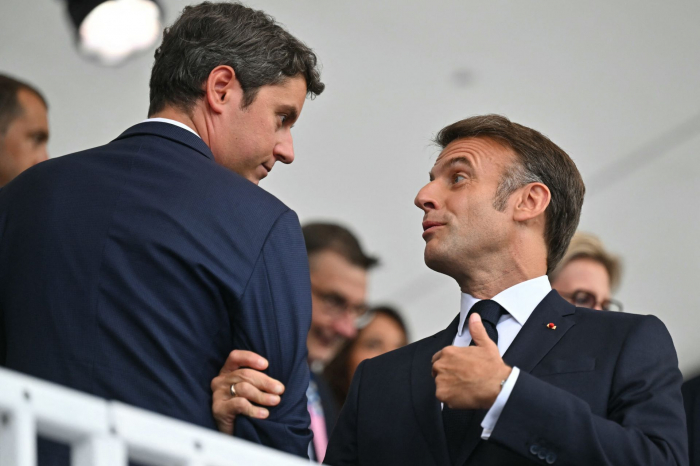The distraught look on Gabriel Attal’s face as French President Emmanuel Macron announced plans to call snap elections after his party’s hammering in the European election in June, captured by the president’s own personal photographer, hinted at the turmoil ahead.
Just a few months earlier, Macron had placed his trust in Attal, making him the youngest prime minister in French history. But the president’s abrupt decision, taken in the wake of a crushing victory for the far-right National Rally, meant the 35-year-old’s time at Matignon would likely be cut short as the outgoing government’s centrist coalition held little to no hope of winning.
That’s when Attal decided to take matters into his own hands.
“I didn’t choose to dissolve parliament — but I refused to remain passive,” Attal said in the aftermath of the snap elections.
During the campaign, the outgoing prime minister successfully filled a power void. Disheartened by the president’s seemingly maverick decision to call new elections and wary that his low favorability ratings could impact their reelection bids, MPs chose to rally behind the young and combative Attal rather than the toxic Macron.
With the presidential camp landing a better-than-expected result in the snap elections, the soon-to-be former prime minister can now position himself for the future — free from Macron’s authority.
Despite losing roughly one-third of its seats in the National Assembly, the centrist coalition managed to place second behind the left-wing New Popular Front (NFP) alliance, but ahead of the National Rally, which pollsters had expected to win. With a fractured legislature, centrist forces could come to play a key role despite their electoral defeat.
In the wake of this partial success snatched from the jaws of defeat, Attal seized the moment and took control of the main centrist group in parliament, Renaissance, against the president’s wishes.
Now, the 35-year-old has his eyes set on taking over the party as well, putting him once more on a collision course with the French president — a man who once described him as being “a little bit like my little brother.”
From Macron’s mini-me, to threat
A gifted communicator without a predominant ideological line, Attal had been a valuable asset for Macron since his 2017 election. After entering parliament, Attal, a product of Parisian elite institutions, served as minister for youth, budget, and education, and had a brief stint as government spokesperson during the COVID-19 pandemic before becoming prime minister.
Although a former Socialist Party member, Attal embraced right-leaning policies, positioning himself as a law-and-order figure, a stance that boosted his popularity.
At the time of his appointment, Attal was seen as Macron’s last card against the meteoric rise of the far right’s own rising star, Jordan Bardella, ahead of the European election. Attal actively took part in the EU campaign, even at the risk of overshadowing Renaissance’s lead candidate Valérie Hayer, but ultimately failed as Bardella’s National Rally ended up with a double-digit lead over centrists.
Still, Attal appears to have come out unscathed from his own camp’s electoral woes.
“Gabriel Attal is as popular as ever with the French, despite his defeat in the European elections and the legislative elections, which had no impact on his popularity,” said Baptiste Dupont, a researcher for polling institute IFOP. “Calling snap elections wasn’t a popular decision which is why Gabriel Attal didn’t lose popularity, he took a stand against the president, saying he didn’t understand, hadn’t chosen the dissolution.”
“The role of villain fell on the shoulders of the president,” Dupont added.
Macron formally accepted Attal’s resignation on July 16, and the outgoing prime minister has since acted as the leader of a caretaker government as the president takes his time in appointing a new executive.
Meanwhile, Attal has continued to build his political identity, managing crises and celebrating with athletes during the Paris Olympics, while embracing his new role as a parliamentary leader.
Despite Macron’s delay in forming a new government, Attal reached out to other parliamentary group leaders, proposing policy talks in the fractured legislature where no single group holds a majority.
His ambitions are increasingly unsettling the president’s allies.
“If you start the 2027 [presidential] campaign now, you’ll be swept away,” Macron, who will not be allowed to run for reelection in three years, told leaders within his coalition, Attal included, during a meeting at the Élysée palace, Le Parisien reported. Macron asked his allies to put the “nation” ahead of their “premature ambitions.”
Attal’s plan to lead both Renaissance’s parliamentary group and the party, which would give him control over campaign strategies and funds, has sparked criticism. “There’s no better way to get burned than trying to control everything at once,” said a Renaissance heavyweight and Macron ally, who spoke on condition of anonymity.
Despite the discontent at the ´Élysée, Attal is gaining support among lawmakers. “Gabriel Attal is a ripening political fruit. He’s not yet ripe, but he’s moving through the stages at full speed,” said Renaissance MP Anne Genetet.
“Gabriel Attal’s campaign proves that when you give it your all, you get results,” Genetet added, owning up to a “deliberate quip” at Attal’s predecessor Élisabeth Borne and Macron.
Politico
More about:















































